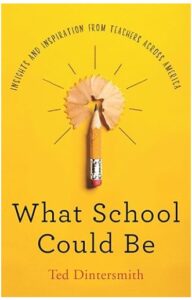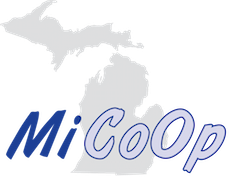| October 30, 2024 |
Book Club Kick-Off/Introductions
In this first meeting of our book club, we will spend time meeting one another and discussing why we want to read this book.
|
| November 20, 2024 |
Chapters 1 & 2
Chapter 1 Reflection/Potential Discussion Questions
- How did the high school you attend compare to Eisenhower High? How well did your high school prepare you for college? For life? Which experiences from your K12 years had the biggest positive impact on you?
- In what ways do you think your school is preparing students for their future?
- The author believes that our nation could have 50-100 million unemployed adults two decades from now. Watch this short video on The Future of Work. Could our democracy withstand that? What role could education play to make the future the best of times for today’s children?
- On a scale of 1 to 10, what level of urgency does your school community place on innovating to keep pace with the fast-changing demands of career and citizenship? How could you create a higher sense of urgency?
- What holds your school back from innovating? Are these factors simply obstacles, or absolute barriers? How can you mitigate these factors?
Chapter 2 Reflection/Potential Discussion Questions
- In what ways is your school helping students develop a genuine sense of purpose? Or is their sense of purpose being hollowed out? If you ask students why they’re doing their schoolwork, how would they respond?
- During a typical school week, how much agency do your students have? Does student agency increase or decrease as they move from early grades to high school? How much agency do you feel your teachers have each week? What are small steps your school could take to afford students and teachers more agency?
- What would convince you that someone has really learned something? What are things you’ve really learned? How can you ensure your students master what they study? Would you be willing to gauge retention and mastery by re-testing students on material they studied a few months ago?
|
| January 14, 2025 |
Chapters 3-5
Chapter 3 Reflection/Potential Discussion Questions
- How would your school change if college admissions and standardized tests disappeared? The author argues that a singular focus on college-ready curriculum leaves students ill-prepared for life, career, and citizenship. Do you agree?
- The author argues that hands-on, or applied, learning (e.g., vocational education/CTE) is a powerful path to understanding core principles, and would benefit all students — irrespective of college plans. Do you agree? How important is hands-on learning in your school? What could you do to elevate it?
- In what ways is your school preparing students for citizenship? Does this study concern you? How could you improve your graduates’ citizenship skills? Would you be willing to ask your high-school seniors to conduct an impromptu teaching session on the U.S. Constitution to see whether they understand its role?
- While some view the liberal arts as a distraction from career preparation, the author argues that they can be excellent career preparation. What do you think? How have liberal arts courses shaped your career?
Chapter 4 Reflection/Potential Discussion Questions
- When you meet someone new, how much does their college pedigree influence how you regard them?
- If you went to college, what experiences stood out? How much did you learn in your lecture courses? In a world where college lecture courses are available online for free, why do you think so many pay so much to attend college? Is higher education leveling America’s playing field, or further tilting it?
- Under what circumstances should a high-school student consider taking a gap year? A few years off? Even foregoing four-year college altogether?
- What role can certificate programs and community colleges play in creating affordable, meaningful career pathways? Do you encourage your students to consider this path? Why or why not? All kids or some kids? Would you consider inviting speakers to your school who have achieved success and fulfillment through certificate programs, community college, and entrepreneurship? If you have college pennants and posters visible in your school, would you consider celebrating students who had pursued alternative paths to a fulfilling career?
Chapter 5 Reflection/Potential Discussion Questions
- Are the parents in your school community too involved, not involved enough, or appropriately involved?
- If parents aren’t involved enough, what steps might increase their engagement?
- If parents are too involved, how can we help them realize that a micro-managed child isn’t prepared to thrive as an adult?
- If a student approaches you with a well-thought out plan for year-long independent study initiative, under what circumstances would you approve it? Award credit for it?
|
| March 20, 2025 |
Chapters 6-8
Chapter 6 Reflection/Potential Discussion Questions
- Investigate the variations in funding levels for public school districts in your state. If these allocations are inequitable, how important is it to level the playing field? Who should be responsible?
- The author argues that standardized tests (e.g. state-mandated, SAT, ACT) reflect the motivation and resources of the parent, more than the child’s motivation and competencies. Do you agree? What impact did these tests have on your self-image? On your students?
- What are your state’s high-school graduation requirements, and are they tied to competencies essential for adults? How would you change them? About 20% of U.S. K12 students don’t get a high-school diploma. Given the challenges of any adult in America today lacking a high-school degree, do you feel the requirements to graduate are acceptable?
- What is the role of culture-based and place-based learning in your school? The author argues that our goal in language arts should be to foster a love of language in our students, and start with what engages the child. How would you view a school that prioritized hip hop over Shakespeare?
Chapter 7 Reflection/Potential Discussion Questions
- The author argues that NCLB and standardized policies have pushed our schools to focus on ranking human potential, not developing it. What should the balance be? What is the balance at your school? How can you better help your students to develop their distinctive potential?
- What should be the role of work-based experiences (e.g., internships, real-world projects, job shadowing) in a child’s education? Is this something for ‘some’ kids or all kids? How important is this in your school? What are small steps you could take next school year to help your students connect their learning to the real world?
Chapter 8 Reflection/Potential Discussion Questions
- What is your view of education reform policies that push for higher test scores and more high-school graduates going to four-year college? Do you agree with these teachers? What has been gained and lost with this focus? Do you agree with the author that this reform-agenda focus threatens our democracy?
|
| May 20, 2025 |
Chapters 9 & 10/Wrap-Up
Chapter 9 Reflection/Potential Discussion Questions
- If you were trusted to design an accountability framework for your district, what would it look like? How could you ensure outsiders that your accountability approach is authentic?
- On balance, are the schools in your community “doing obsolete things better,” or “doing better things”?
Chapter 10 Reflection/Potential Discussion Questions
- How can you energize your community to support your innovations?
- How could local businesses and non-profits enhance the learning of your students? What initial steps could you take next school year to help make this happen?
Big Questions
- What are the most important innovations your school has tried? In what ways was each effective? Have they spread? How can you encourage others to try them?
- Which innovations in this book might benefit your school? Why? How could your school take this forward?
- How well is your school doing in helping your students develop Purpose, Essential Skills and Mindsets, Agency, and Deep, Retained Knowledge? How might you improve next school year?
|

